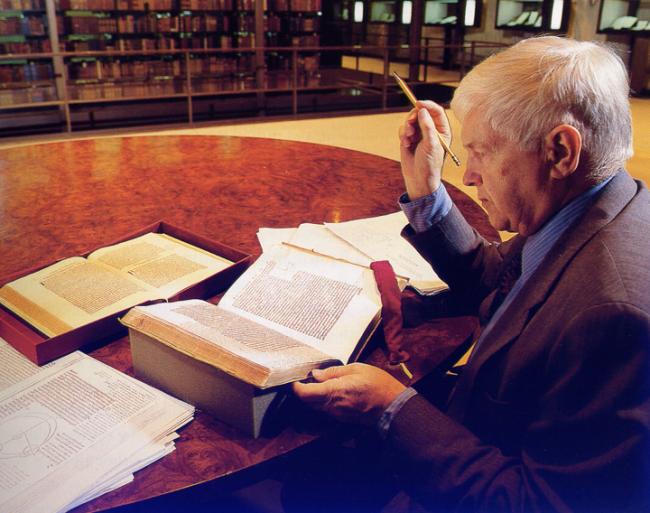
Prof. Owen Gingerich
On December 4, 2015, Owen Gingerich was awarded a gold medal by Krzysztof Ostrowski, the visiting vice-rector of the Pultusk Academy, the newest university in Poland. Gingerich received the medal in honor of his researches on the 16th-century astronomer, Nicolaus Copernicus.
This achievement resulted from Gingerich's 30-year quest to see all surviving 16th-century copies of Copernicus' De revolutionibus ("On the Revolutions"), the book that declared that the sun, and not the earth, was at the center of the cosmos. This quest is documented in Gingerich's The Book Nobody Read.
 |
Copernicus died in 1543, and his remains were interred in the Frombork Cathedral in Poland. However, because there were more than a hundred skeletons under the floor of the cathedral, no one knew which remains belonged to Copernicus.
By a process of elimination the search area was narrowed to a single altar. Excavations uncovered a dozen burials. At the lowest level, the searchers found the scattered bones of a 70-year-old man. This was the obvious candidate for Copernicus, but how could they be sure?
With the benefit of modern technology, a DNA test was the obvious solution. Copernicus, as a canon of the Frombork cathedral, had no known direct descendants, and the line of his collateral descendants came to an end by 1700. No modern relatives existed.
The solution was to look for a sample of DNA from Copernicus himself - not his bones, but his hair. Gingerich had identified a copy of a 1518 book owned by Copernicus, through annotations Copernicus made in the book's margins. Researchers carefully paged through the book and found seven hairs for testing. Two of them proved a match to the DNA in a tooth from the skeleton. Copernicus's relics had been found.
Gingerich received an e-mail from Francis Collins, director of the National Institutes of Health, saying, "Isn't DNA wonderful!" Gingerich replied that he had photographed the book, so one or more of the other hairs could have been his. Should he have his DNA analyzed? "But of course!" Collins replied. But so far he hasn’t had it done.
The famous astronomer's remains were reburied in 2010 with great pomp and circumstance, with Owen Gingerich and his wife among the dignitaries in attendance. As Gingerich says, "I attended the funeral of Copernicus."
The citation Gingerich received reads: "Professor Owen Gingerich has received a gold medal minted by the Pultusk Academy of Humanities in order to celebrate the identification research of Nicolaus Copernicus' grave, reburial, and renewal of the Declaration of Frombork."